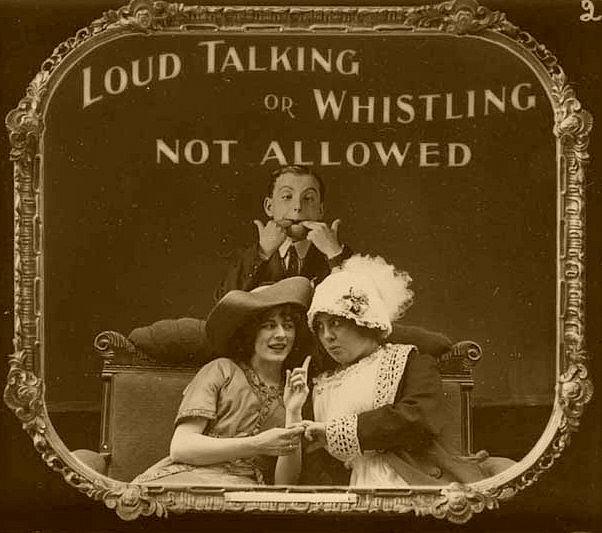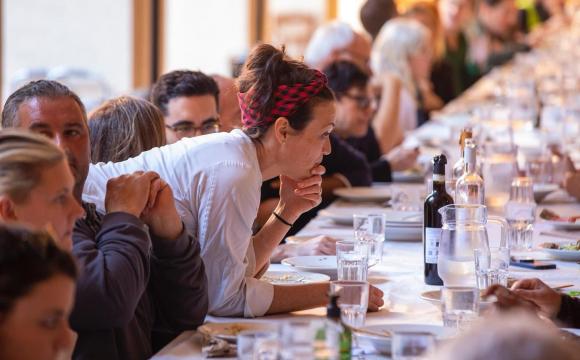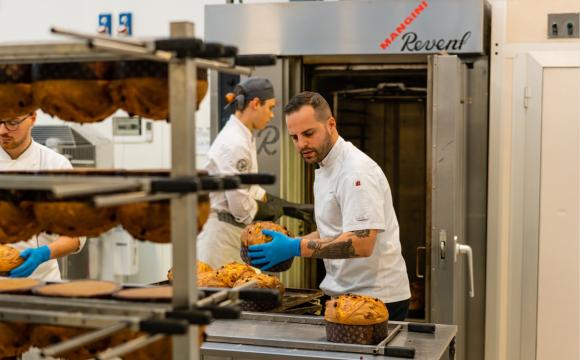 There are a few things that come to mind as more specific to Italian culture that would be considered rude or impolite. For example:
- Using informal language in more formal situations to address strangers, older people or people in authority. However, people understand that a foreigner might do that because of limited language skills rather than disrespect.
- Getting drunk. It is not socially acceptable to be drunk, neither is it considered something funny to talk about with your friends. There are signs that this might be changing among the youngest generations though.
- Picking up food in the produce section of the grocery store or supermarket without wearing plastic gloves (which are readily available in the produce section).
- Leaving bread upside down on the table as it is considered disrespectful and believed to bring bad luck.
But Italians who really care about 'proper manners' often refer to the Italian 'Bible' of good manners, "Il Galateo overo de’ costumi", a treatise of polite behaviour written by poet, writer and diplomat Giovanni Della Casa (28 July 1503 – 14 November 1556) in 1558 for the benefit of his nephew, a young Florentine destined for greatness.
There are a few things that come to mind as more specific to Italian culture that would be considered rude or impolite. For example:
- Using informal language in more formal situations to address strangers, older people or people in authority. However, people understand that a foreigner might do that because of limited language skills rather than disrespect.
- Getting drunk. It is not socially acceptable to be drunk, neither is it considered something funny to talk about with your friends. There are signs that this might be changing among the youngest generations though.
- Picking up food in the produce section of the grocery store or supermarket without wearing plastic gloves (which are readily available in the produce section).
- Leaving bread upside down on the table as it is considered disrespectful and believed to bring bad luck.
But Italians who really care about 'proper manners' often refer to the Italian 'Bible' of good manners, "Il Galateo overo de’ costumi", a treatise of polite behaviour written by poet, writer and diplomat Giovanni Della Casa (28 July 1503 – 14 November 1556) in 1558 for the benefit of his nephew, a young Florentine destined for greatness.
 In a style that is colloquial and lively, Della Casa instructs him on what to do, and what to avoid doing, in order to be considered appealing, sophisticated, and polite. From the time of its publication, this courtesy book has enjoyed enormous success and influence. It was particularly popular during the Renaissance, and, within two years of its publication in Venice in 1558, editions appeared also in Milan, Rome, Florence and Bologna. It was later received with enthusiasm in France, Spain, Germany and England.
Still considered the most celebrated etiquette book in European history, this is a manual many Italians continue to regard as the guide to polite behaviour and to a respectful existence, even if they have never read it.
According to Della Casa, the successful man, must combine an exterior grace with a necessary social conformity. Anything that could give offense or reveal vulgar or crude thoughts should be avoided and one must use caution, tact, and discretion at all times.
As influential critic Giuseppe Baretti wrote in The Italian Library (1757): "The little treatise is looked upon by many Italians as the most elegant thing, as to style, that we have in our language."
The University of Chicago Press has recently published a new edition, translated by M.F. Rusnak, claiming that Galateo continues to be useful today as it was in the Renaissance, as it deals with subjects as varied as dress codes, eating habits, the art of conversation and literary language that are still of great interest.
As Rusnak's edition points out in the introduction, far from being a book on table manners and 'place settings' or bridesmaids' gifts, Galateo is a "conduct manual, a viable tourist guide to acting Italian in Italy, and a learned analysis of literary Language".
So when preparing to visit Italy, do not worry too much about specific "dos and don'ts"; it is enough to follow one of Della Casa’s suggestions and hope the people you will encounter on your path will do the same: "Our manners are attractive when we regard others' pleasure and not our own delight."
QUOTES FROM "IL GALATEO"
In a style that is colloquial and lively, Della Casa instructs him on what to do, and what to avoid doing, in order to be considered appealing, sophisticated, and polite. From the time of its publication, this courtesy book has enjoyed enormous success and influence. It was particularly popular during the Renaissance, and, within two years of its publication in Venice in 1558, editions appeared also in Milan, Rome, Florence and Bologna. It was later received with enthusiasm in France, Spain, Germany and England.
Still considered the most celebrated etiquette book in European history, this is a manual many Italians continue to regard as the guide to polite behaviour and to a respectful existence, even if they have never read it.
According to Della Casa, the successful man, must combine an exterior grace with a necessary social conformity. Anything that could give offense or reveal vulgar or crude thoughts should be avoided and one must use caution, tact, and discretion at all times.
As influential critic Giuseppe Baretti wrote in The Italian Library (1757): "The little treatise is looked upon by many Italians as the most elegant thing, as to style, that we have in our language."
The University of Chicago Press has recently published a new edition, translated by M.F. Rusnak, claiming that Galateo continues to be useful today as it was in the Renaissance, as it deals with subjects as varied as dress codes, eating habits, the art of conversation and literary language that are still of great interest.
As Rusnak's edition points out in the introduction, far from being a book on table manners and 'place settings' or bridesmaids' gifts, Galateo is a "conduct manual, a viable tourist guide to acting Italian in Italy, and a learned analysis of literary Language".
So when preparing to visit Italy, do not worry too much about specific "dos and don'ts"; it is enough to follow one of Della Casa’s suggestions and hope the people you will encounter on your path will do the same: "Our manners are attractive when we regard others' pleasure and not our own delight."
QUOTES FROM "IL GALATEO"
 " One should not annoy others with such stuff as dreams, especially since most dreams are by and large idiotic."
"To offer your advice without being asked is nothing else but a way of saying that you are wiser than those you are giving advice to, and even a reproof for their ignorance and lack of knowledge."
"It is a barbarous habit to challenge someone to a drinking bout. This is not one of our Italian customs and so we give it a foreign name, that is , far brindisi.” [The Italian Far brindisi or Brindare for "to toast" comes from German ich bring dir's, I bring it to you"]
"We do not have the power to change customs as we see fit, for it is time that creates them and likewise time consumes them. Everyone, however, may adapt the current fashion to his own personal style.”
"First of all, one must consider the country where one lives, for every custom is not good in every place. Perhaps what is customary for Neapolitans, whose city is rich in men of great lineage and barons of great prestige, would not do, for example, for the people of Lucca or Florentines who are for the most part merchants and simple gentlemen and have among them neither princes, nor counts, nor barons."
" One should not annoy others with such stuff as dreams, especially since most dreams are by and large idiotic."
"To offer your advice without being asked is nothing else but a way of saying that you are wiser than those you are giving advice to, and even a reproof for their ignorance and lack of knowledge."
"It is a barbarous habit to challenge someone to a drinking bout. This is not one of our Italian customs and so we give it a foreign name, that is , far brindisi.” [The Italian Far brindisi or Brindare for "to toast" comes from German ich bring dir's, I bring it to you"]
"We do not have the power to change customs as we see fit, for it is time that creates them and likewise time consumes them. Everyone, however, may adapt the current fashion to his own personal style.”
"First of all, one must consider the country where one lives, for every custom is not good in every place. Perhaps what is customary for Neapolitans, whose city is rich in men of great lineage and barons of great prestige, would not do, for example, for the people of Lucca or Florentines who are for the most part merchants and simple gentlemen and have among them neither princes, nor counts, nor barons."











